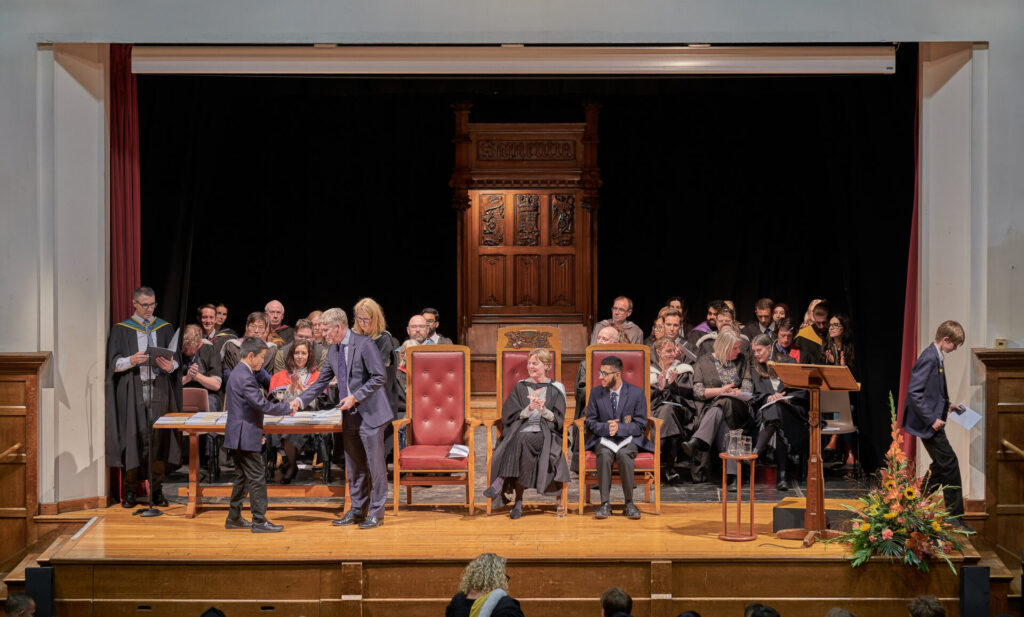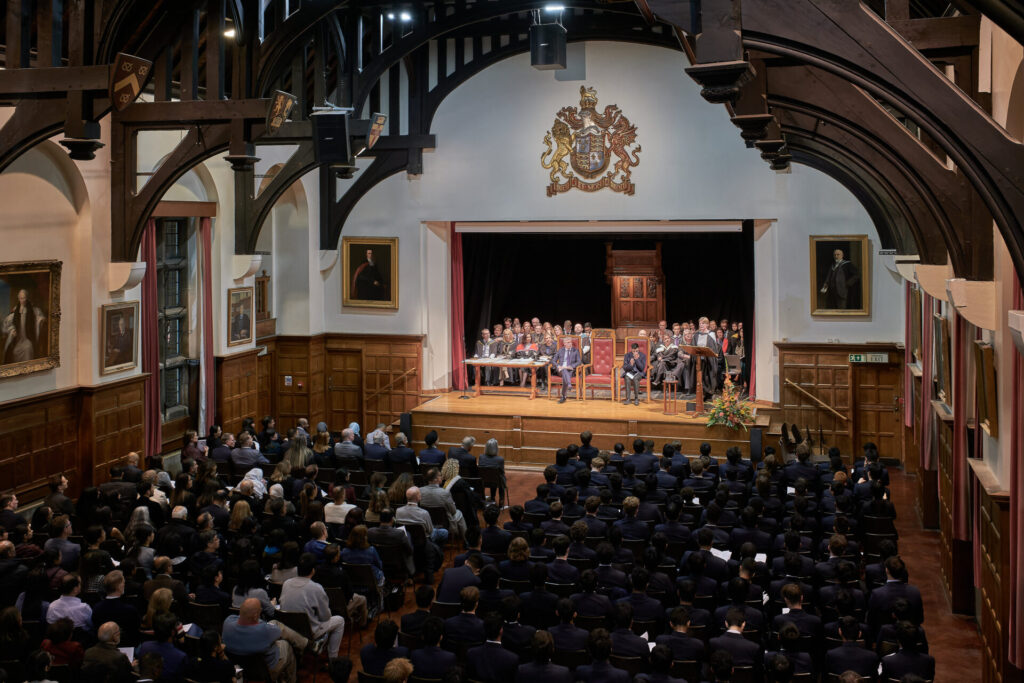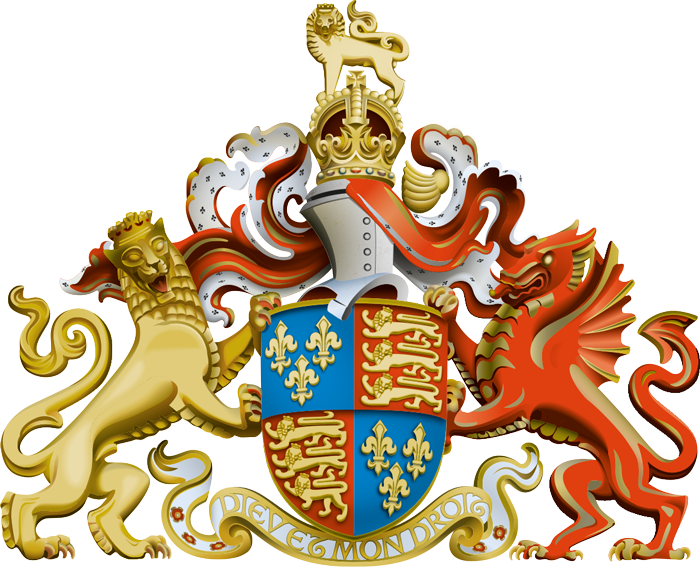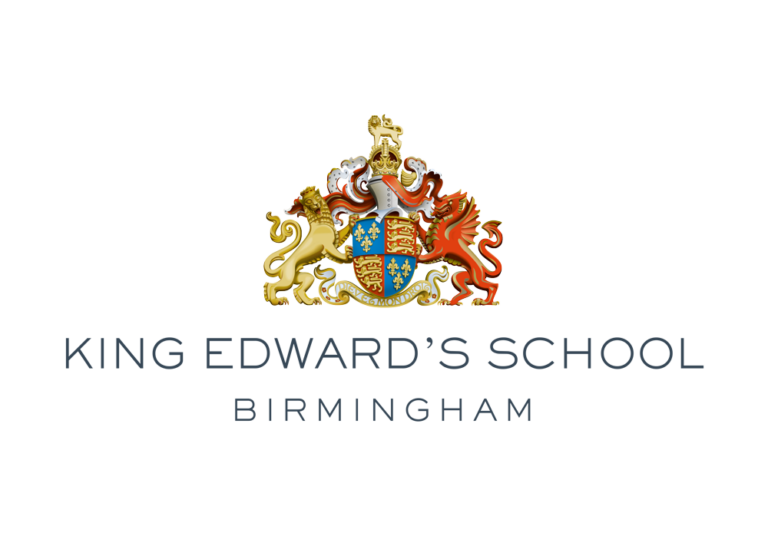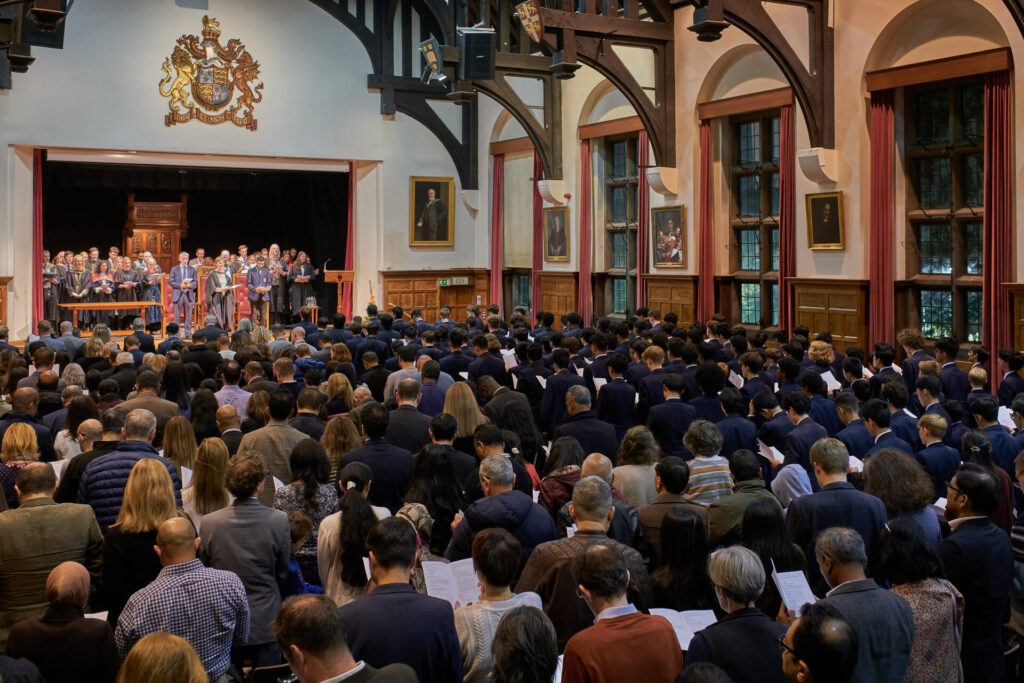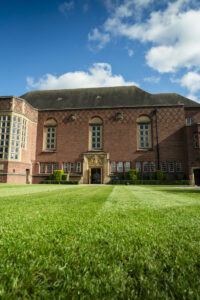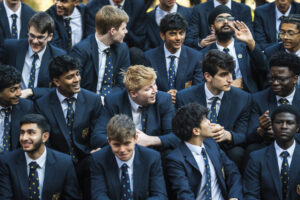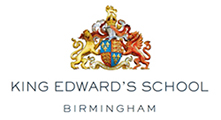The ceremony began with the stirring notes of the National Anthem setting a dignified and celebratory tone. This was followed by the reading of The Founder’s Prayer by our Chief Master & Principal, Mrs Kirsty von Malaisé, a poignant reminder of the principles upon which our school was founded.
The Founder’s Prayer
We give thee most humble and hearty thanks, O most merciful Father, for our pious Founder, King Edward the Sixth, and for all our governors and benefactors, by whose benefit this whole School is brought up to godliness and good learning; and we beseech thee to give us grace to use these thy blessings to the glory of thy holy name, that we may answer the good intent of our religious Founder, and become profitable members of the Church and Commonwealth and at last be partakers of thy heavenly Kingdom: Amen
Musical interlude
Tian (Sixths), James (Sixths), Siyuan (KEHS) and Tarrun (Sixths) performed the first movement of Alexander Borodin’s String Quartet No. 2 in D major. Their rendition of Allegro Moderato was both elegant and expressive, showcasing the ensemble’s musical technical skill.
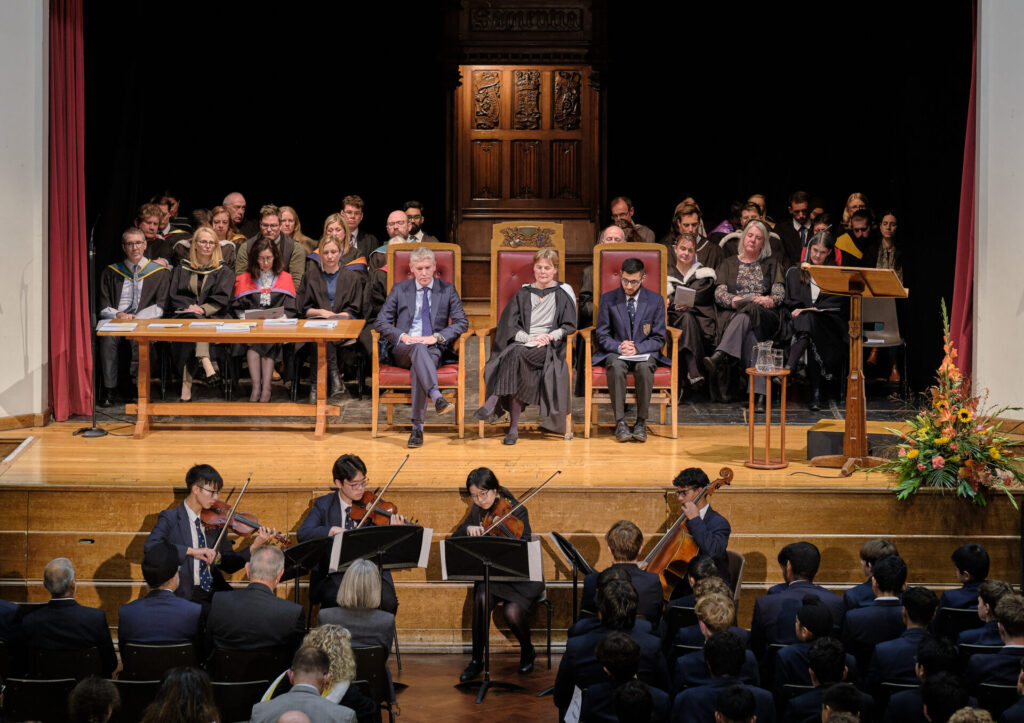
Inspiring words
We were honoured to welcome William Cadbury (OE 1995) as our guest speaker. William shared invaluable insights and inspiring reflections from his own journey since leaving King Edward’s School.
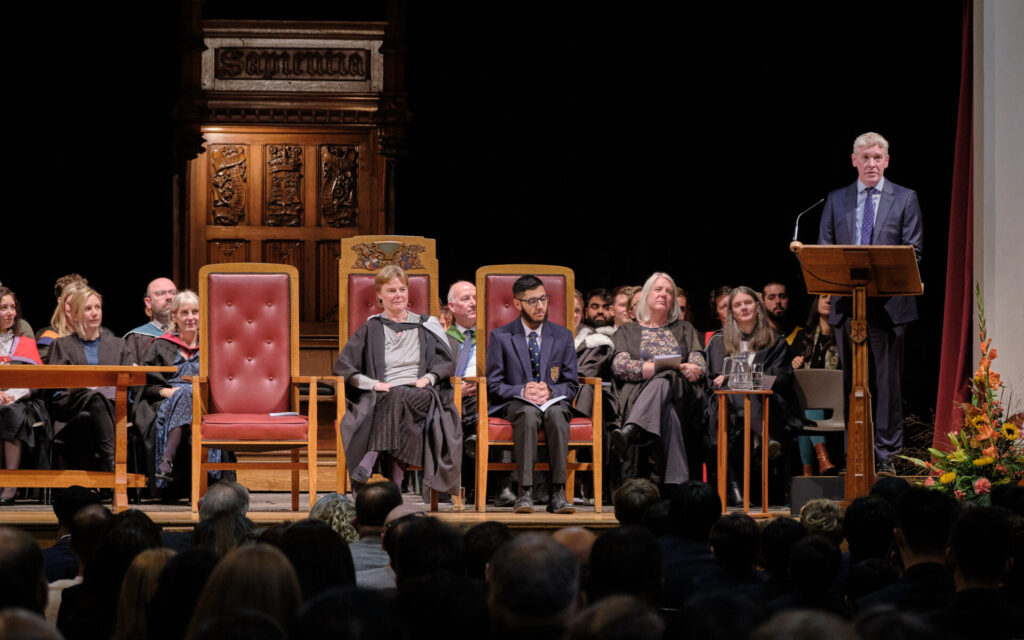
A message from the Chief Master & Principal
Mrs Kirsty von Malaisé shared an introductory speech with the school community – here is the full speech in case you missed it:
Good evening and a very warm welcome to Founder’s Day. It’s a pleasure to greet our governors, distinguished guests, parents, and- most importantly- our pupils, who are being celebrated today for their remarkable achievements over the past year. We are honoured to be joined by our guest speaker, William Cadbury, a proud member of the Class of 1995. William is currently Chief Financial Officer at Noble Foods and serves as a trustee of the Bournville Village Trust, one of the Midlands’ longest-standing independent charitable trusts, founded in 1900 with a legacy of community impact. A legacy of community impact- that is very much an aspiration of a King Edward’s education.
We’re delighted that William has returned to King Edward’s tonight to share his journey- from school days to boardroom- and to reflect on how his time here helped shape his path. We’re all looking forward to hearing your insights, William, and thank you for being part of this special occasion.
This time last year, Founder’s Day fell under a dark shadow-the shade of one of history’s greatest and most brutal tyrants, Joseph Stalin. He was quoted and referred to three times quite independently, by me, by Aaryan, last year’s School Captain, and by our guest speaker.
I think all three of us were aware that this government’s assault on independent schools had everything to do with our greatest offence: that of being independent. The fig leaf was the supposed intention of squeezing money out of these schools to fund our fellow schools in the state sector. Not even a year later the fig leaf has fallen off: the net gain that may or may not be left over after the continuing closure of independent schools diminishes by the day, or has even gone into the red. It’s certainly not ring-fenced for educational purposes. Thankfully, every major opposition party has undertaken to abolish these ideologically motivated seizures from educational charities such as ours, and at present, it does not look likely that the current government will last. You might recall that there was a court case in April, which challenged the imposition of this tax. Although the case was unsuccessful, it did manage to establish four important facts:
- Children have a right to education and protection from discrimination.
- Children’s rights were affected by this tax: the policy had a discriminatory impact.
- Despite the government’s ‘wide margin of discretion’, the right to independent education is protected.
- VAT was not ‘closing a tax loophole’, as you will have heard our Education Secretary repeating two weeks ago, incorrectly- but it was imposing an additional tax.
Well, I thought you’d appreciate that update, and you may have been following it intently.
But I’d like to move on and speak less of destructiveness, shadows and tyrants tonight; instead, on this Founder’s Day and our celebration of our pupils’ fantastic achievements, I think we are all going to speak tonight to different parts of our rounded King Edward’s education, and to look to the light.
Now, if you suddenly became very uncomfortable that I was going to start talking about religious matters, you can sit comfortably again.
If we think of light as an image in the history of the mind, we are drawn inevitably to the Enlightenment. Now of course, the Enlightenment means many things, but few of its protagonists can be accused of false modesty. To sit down, like Diderot, to compile an encyclopaedia of the entirety of human knowledge, is not for the faint hearted, nor for those lacking self-belief. We now understand that the Enlightenment of the seventeenth and eighteenth centuries would have been inconceivable without the achievements of the Renaissance that went before it, and that in turn built on the mediaeval foundations of our universities, and the great Thomist synthesis of Aristotle and Christian doctrine. Our Foundation sits squarely in the middle of that- education had been fostered by some of the monasteries and guilds, so when the Crown seized them, there were those in Birmingham, the men who comprised The Foundation of King Edward VI who wanted that work to continue and to flourish. The study of the ancient languages was progressing and seen as crucial to gaining recovered wisdom and understanding. Study, wisdom, understanding- these are principles in common with an important figure from that later evolution of the Western mind, the Enlightenment, whom I want to focus on this evening.
The eighteenth century has sometimes been called the Age of Reason, and with it went the belief that, with the right intellectual tools, we could come to describe and understand how our world worked accurately. In Britain we see a focus on what today we would call the scientific method, with its emphasis on observation, testing and prediction. But this evening we have time only to reflect on the importance of one individual, who is also one of the most sympathetic and civilised representatives of that age, the Baron de Secondat de Montesquieu. He’s important not just because of his ideas, but because of their influence far beyond the shores of France. He was the most frequently quoted authority on politics in pre- revolutionary British America other than the Bible. It is said that significant parts of the American constitution owe their existence to him. Montesquieu’s early life was not untypical of a well-to-do regional aristocrat in eighteenth century France- a good education, a sensible marriage, and an inherited position in the local legal assembly. A comfortable position and career awaited him. But after a few years, he withdrew from legal practice, and devoted himself to study and writing. Of course it helped that he had the private means so to do.
Throughout his life, he was an active collector of books. His library, now in Bordeaux, contains nearly 4,000 volumes. It’s reassuring to know that even in the 18th century, some people looked at a stable job and decades ahead of commuting, memos and staff meetings, and thought, “I’d rather read 4,000 books.”
Very typically for the Enlightenment, he had a variety of interests, and sought to find how they might be connected. He was interested in history, politics and economics, but also geography, climate change and what today we would probably call anthropology, the study of the origins of human behaviour. There are three works for which he became particularly well known: The ‘Persian Letters’ are a masterpiece of satire: They are written from the supposed point of view of two Persian Muslims on a visit to eighteenth century France- through their reflections as apparently neutral observers, Montesquieu laid bare some of the absurdities and oddities of his own culture and times. One of them writes about Louis XIV, who had recently died when the work was published: ‘I have made a study of his character, and I find contradictions which I am unable to reconcile, for example, he has a minister who is only eighteen years old, and a mistress who is eighty…he loves trophies and victories, but he is afraid of seeing a good general at the head of his troops’. Clearly, Louis XIV believed in diversity—of ages, if not of opinions. This text is both a delicate and a sharp critique of the absolute monarchy, which by the end of the century, would be swept away. Satire, we might say, is one of the signs of the health and vigour of an intellectual climate.
Secondly, quite early in his career, he became well known for his ‘Considerations on the Greatness of the Romans, and their Decline’. This topic- how the greatest civilisations decline- had fascinated the Western mind for centuries, and was of course used as a mirror to reflect on contemporary problems. Montesquieu had a fairly unflattering view of the Romans: From early on, they were good at fighting and looting, but they were also supremely adaptable and ready to learn from others. It was the very success of Rome’s military conquests and the transition to an imperial system, that bore the seeds of its decay. We can see that Montesquieu was suspicious of military over-extension and what today we would call ‘colonialism’- in the end, he would argue, it corrupts the colonisers.
The main focus of such a corrupted civilisation becomes wealth and its acquisition. This then leads to decadence, the symptoms of which he saw as follows: an ageing population focussed on consumption, an unwillingness to have children or wage war, and an ever increasing gulf between rich and poor. If much of this sounds strangely familiar, then of course that is exactly what Montesquieu intended.
And then finally we come to the work of his maturity, in which he tried to draw together some of his thinking from different fields. ‘The Spirit of the Laws’, published in 1748, undertook a broad survey of different societies, epochs and political systems. One of its most influential themes is the question of how to establish and preserve ‘political liberty’, or what we might call personal freedom and security. Montesquieu argues that ‘political liberty’ can only happen in states which practise the ‘separation of powers’ between the executive, the legislature, and the judiciary, so that if one branch seeks to become too powerful, the others can restrain it. Again, it is fascinating to reflect how the relationship between government, parliament and the courts remains a topical discussion today. Montesquieu would ask us to consider if we really have a true separation of powers. Does our executive, our government, have overarching powers by controlling the civil service, the police, an enfeebled parliament where votes are largely pre-determined, and a judiciary that is more and more under the control of a government that is headed by lawyers, and that knows how to pursue its opponents in what has become known as ‘lawfare’? These are all questions Montesquieu would have recognised and wanted us to ask. And they come with one of his most famous warnings, the warnings, after all, of someone who had been a professional lawyer: ‘The harshest tyranny is that which acts under the protection of legality and the banner of justice’.
So, Montesquieu, an urbane civilised, cultivated man, always curious, always open to new understanding, a reader, a questioner. He represents much that was good in the eighteenth century Enlightenment, and still has the power to speak to us today. I think we should be especially attentive to his voice and example, if we pause to consider the intellectual climate of our own time, which cannot but affect us as a leading academic school.
The commentator James Marriot of ‘The Times’ wrote at the end of last month: ‘Far from a land of Enlightenment, Britain, along with the rest of the modern West, is in the grip of what might be characterized as an intellectual crisis: A recent OECD report found literacy and numeracy declining or stagnating in most developed countries. Average IQ, having risen for the entire 20th century, now appears to be falling’. Reading is in decline for both children, and adults- I note at the weekend that even some celebrities are endorsing the lost art of reading, something I often mention in my own assemblies, and supported by all our staff in driving our boys to search out the very best books. Some have suggested we are entering an age of ‘disenlightenment’, of intellectual decay, an age that rejects reason in favour of emotion, that cannot distinguish between grounded knowledge and opinion, that replaces dialogue with outrage and abuse, that often seems to have abandoned the idea of truth itself as an intellectual good. These are not things that anyone should wish for our school, nor indeed anyone they care about. These are not the habits of mind that cure cancers, that construct a vaulting bridge, that seek to discern natural justice as well as the administration of the law, that try to create things of beauty that move the hearts and minds of men and women.
Today the cultural habits of a good education won’t happen by themselves. These are things we can no longer take for granted, though perhaps they are easier in a school which has some independence from the state. If we want good learning to flourish here, then we will have to be ready to defend, explain and justify what we do. For such a task, Montesquieu is not a bad guide.
So what are we doing? To end with, let me offer three brief reflections in the spirit of Montesquieu.
Through our education we want to give our pupils the gift of freedom. Freedom to know their own minds, make their own responsible choices, and to defend the freedoms that we share with others: that we become citizens who won’t support tyranny.
Through our education we want to give our pupils the sense of the power of learning, as a lifelong habit of mind. That sense of curiosity, openness to new and different ideas, the enormous power of genuine and open dialogue, the give and take of intellectual exchange. Learnedness, not just in our chosen fields, but in our understanding of the world, is a key component of becoming a wise person.
Through our education, here at King Edward’s, we open doors to real social and intellectual mobility. Montesquieu became uneasy when he encountered growing gaps between rich and poor. Our school has always provided a bridge between those who have much and those who have less, through our Assisted Places provision, and through our partnerships with many other local schools. We are, as has never been recognised by this government’s additional taxation, an engine of social mobility in this great city.
As we will shortly sing in our school song, They who gave our School its laurels laid on us a sacred trust;
Those values, achievements, and high ideals of education from our school’s past are important to recall and to sustain, on this, our Founder’s Day. For all of us here, it is a responsibility, and of course, an honour.
Founder’s Day is always a special occasion at King Edward’s School. It brings our community together to celebrate achievement, reflect on our values, and honour the legacy of our Founder. This year’s ceremony was a meaningful reminder of all that makes our school unique.
